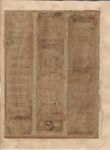< Catechizing a Buddhist (continued from page 4-62) >
...

Buddhism in America
To the Editor of The Sun – Sir : As, in your leading article of May 6th, I am at one moment given credit for knowing something about the religion of the Brahmans and Buddhists, and, anon, of being a pretender of the class of Jacolliot, and even his plagiarist, you will not wonder at my again knocking at your doors for hospitality. This time I write over my own signature, and am responsible, as I am not under other circumstances.
No wonder that the “learned friend” at your elbow was reminded “of the utterances of one Louis Jacolliot.” The paragraphs in the very able account of your representative’s interview, which relate to “Adhima and Heva” and “Jezeus Christna,” were translated bodily, in his presence, from the French edition of the Bible in India. They were read, moreover, from the chapter entitled, “Bagaveda-Gita,” which, doubtless, most American scholars have read. Jacolliot spells the name Bagaveda instead of Bhagavad as you put it, kindly correcting me. In so doing, in my humble opinion, he is right, and the others are wrong; were it but for the reason that the Hindus themselves so pronounced it—at least those of Southern India, who speak either the Tamil language or other dialects. Since we seek in vain among Sanskrit philologists for any two who agree as to the spelling or meaning of important Hindu words, and scarcely two as to the orthography of this very title, I respectfully submit that neither “the French fraud” nor I are chargeable with any grave offense in the premises.
For instance, Prof. Whitney, your greatest American Orientalist, and one of the most eminent living, spells it Bagavata; while his equally great opponent, Max Müller, prefers Bagavadgita, and half a dozen others spell it in as many different ways, as naturally, each scholar, in rendering the Indian words into his own vernacular, follows the national rule of pronunciation; and so, you will see, that Prof. Müller in writing the syllable ad with an A does precisely what Jacolliot does in spelling it ed, the French E having the same sound as the English A, before a consonant. The same holds good with the name of the Hindu Saviour, which by different authorities is spelled Krishna, Crisna, Khristna and Krisna; everything, in short, but the right way—Christna. Perhaps you may say that this is mere hypothesis. But since every Indianist follows his own fancy, in his phonetic transcriptions, I do not know why I may not exercise my best judgment, especially as I can give good reasons to support it.
You affirm that there “never was a Hindu reformer named Jezeus Christna”; and, although I confined my affirmation of his existence to the authority of Jacolliot at the interview in question, I now assert on my own responsibility that there was, and is, a personage of that name recognized and worshipped in India, and that he is not Jesus Christ. Christna is a Brahmanical deity, and, except by the Brahmans, is recognized by several sects of the Jainas. When Jacolliot says Jezeus Christna he only shows a little clumsiness in phonetic rendering, and is nearer right than many of his critics. I have been at the festivals of Janmotsar, in commemoration of the birth of Christna (which is their Christmas), and have heard thousands of voices shouting: “Jas-i-Christna! Jasas-wi-Christna!” Translated, they are: Jas-i — renowned, famous; and Jasas-wi — celebrated, or divinely renowned, powerful; and Chris-tna, sacred. To avoid being again contradicted, I refer the reader to any Hindostanee dictionary. All the Brahmans with whom I have talked on the subject spoke of Christna either as Jas-i-Christna, or Jadar-Christna, or again used the term, Jadur-pati, Lord of Yadavas, descendant of Yadu, one of the many titles of Christna in India. You see, therefore, that it is but a question of spelling.
That Christna is preferable to Krishna can be clearly shown under the rules laid down by Burnouf and others upon the authority of the pundits. True, the initial of the name in Sanskrit is generally written K; but the Sanskrit k is strongly aspirated; it is a guttural expiration whose only representation is the Greek Chi. In English, therefore, the k instead of having the sound of k as in King would be even more aspirated than the h in heaven. AS in English the Greek word is written Christos in preference to H’ristos, which would be nearer the mark, so with the Hindu deity; his name under the same rule should be written Christna, notwithstanding the possible unwelcomeness of the resemblance.
M. Textor de Ravisi, a French Catholic Orientalist, and for ten years Governor of Karikal (India), Jacolliot’s bitterest opponent in religious conclusions, fully appreciated the situation. He would have the name spelt Krishna, because (1) most of the statues of this god are black, and Krishna means black; and (2) because the real name of Christna “was Kaneya, or Caneya.” Very well; but black is Krishna. And if not only Jacolliot, but the Brahmans themselves, are not to be allowed to know as much as their European critics, we will call in the aid of Volney and other Orientalists, who show that the Hindu deity’s name is formed from the radical Chris, meaning sacred, as Jacolliot shows <... continues on page 4-64 >
Editor's notes

